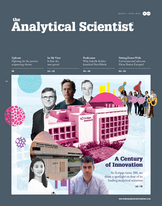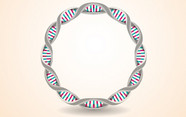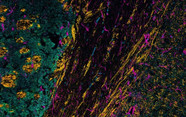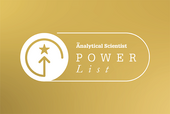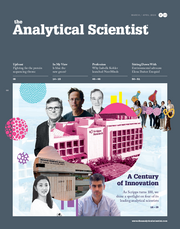
Once Upon a PhD (and a Science Slam)
Mimi den Uijl – 2023 Separation Science Slam silver medalist – discusses the struggles of young scientists, conferences, and the real essence of analytical science
Mimi den Uijl | | 5 min read | Opinion
The Separation Science Slam at the International Symposium on High Performance Liquid Phase Separations and Related Techniques (HPLC) gives younger scientists an opportunity to communicate their research to the HPLC audience in a unique way. The goal is to win the favor of the audience and jury, who take into consideration the scientific content, entertainment value, comprehensibility, and creativity.
Here, 2023 silver medalist Mimi den Uijl, an analytical chemist at the University of Amsterdam and co-creator of @SistersinScience_NL, talks about the stereotypes surrounding the field – which actually fueled her hesitation for a career in chromatography – and how it is possible to slam them away.

Chemistry is something that you can see everywhere, surrounding us – from the food and water we consume, to the fuel in our cars – and an intuition most people have. Take cooks, for example, they actually know how to mix the right ingredients to produce the desired results. Yet it sometimes seems chemistry education struggles to connect that natural intuition to the science of chemistry.
Indeed, there are plenty of misperceptions about the field. My initial reaction, when a highschool teacher initially suggested I study chemistry, was “No, definitely not!” Despite an enjoyment and aptitude for the subject, I felt that I did not fit the stereotypical image of a “chemist.”
The analytical communicator arc…
Although reluctant, I decided to pursue a PhD at the University of Amsterdam on multidimensional liquid chromatography, evolving into a scheikundige (a person who performs “the art of separation” in Dutch).
I found that I had a strong affinity for networking and presenting – both important skills for a scientist (a reality that isn’t widely appreciated). My journey in academia was not limited to the four walls of a lab; I embraced my social side and developed a passion for science communication.
During conferences, I used to worry about more established figures tearing apart my work, but actually there’s no reason for them to demolish the enthusiasm of a young scientist. Imperfections are human, and everyone attending these gatherings is there to learn and share knowledge.
I was introduced to the concept of Science Slams during a conference in 2017 (SETAC), and I realized there are many ways to make science fun, so I set a personal goal: if I ever attended a conference hosting one, I would participate and slam all those fears away.
Slamming the fears away…
The 2023 HPLC Separation Science Slam was the perfect opportunity for me [link when science slam winner roundtable is live]. Despite my lack of singing or dancing skills, I allowed my creativity to flow freely and contemplated a meaningful connection to the conference’s location, Germany. Drawing inspiration from German heritage, particularly the fairytales of the Brothers Grimm, I embarked on a quest to find a fairytale that shared parallels with my research or my PhD journey. Upon recollecting the story of Rumpelstiltskin, I was convinced that I had found the perfect match!
The aim of my research was to create a rapid, robust, and fully integrated analytical system for investigating degradation mechanisms of individual components and mixtures – we accomplished this by incorporating a photodegradation cell, which had been developed by my colleague, Iris Groeneveld at VU University Amsterdam, into various multidimensional liquid chromatography setups. This approach was employed to analyze samples from cultural heritage, such as synthetic organic colorants in Vincent van Gogh’s paintings, as well as food colorants, vitamins, and water samples.
The preparation turned out to be more extensive than I initially anticipated; imagine trying to fit four years of hard work into just a five minute presentation. Crafting the concept itself took up a significant amount of time, but I was committed to creating something truly unique, so I embraced the challenge.
The event has left a lasting impression by showing me that embracing one’s unconventional side can be immensely rewarding. It’s a reminder that there’s room for diverse personalities – and even unexpected traits can be harnessed to their fullest potential, sometimes even leading to some prize money!
Witnessing the audience’s enjoyment of the presentation was truly heartwarming, especially considering it provided a sense of comic relief after a day filled with serious scientific discussions. The sense of acceptance and value I received after the slam was incredibly rewarding.
Although genuinely enjoyable, Science Slams provoke participants to approach their research from new perspectives. It encourages researchers to convey their work using innovative methods and narratives they might not have explored before. It’s a reminder to take pride in such accomplishments and to celebrate our resourcefulness.
The dawn of a new era…
I’ve encountered moments where my communication skills were regarded as “ill-fitting” within the area of chemistry, and I’ve even been questioned about my choice of pursuing a career in chemistry.
To challenge these perceptions and promote a broader and more diverse representation in the field, my colleagues and I initiated the Instagram channel @SistersinScience_NL. This initiative aims to challenge existing stereotypes of what defines a successful researcher and to encourage a wider range of individuals to explore opportunities in analytical chemistry and academia. The beauty of events like the Separation Science Slam lies in their ability to recognize and celebrate various qualities and talents beyond traditional expectations.
In a (still) male dominated industry, there is much pressure to be the “ideal” scientist; extremely smart, opinionated, independent, and, of course, with a very dominant personality – qualities often attributed to men. Contrary, being emotional is often labeled as a “feminine” trait and dismissed because it could interfere with our logical thinking. In reality, emotional intelligence is an important trait to bear as a scientist, if we are to find the real connection with the world and have a meaningful impact.
I would encourage all young scientists not to mold into the image of the “ideal” or “typical” researcher. Instead, lean into your genuine interests and likings. Though the pressure can be quite intense during your PhD, it’s important to understand the substantial level of autonomy you possess. Use this freedom to engage in activities you’re genuinely passionate about.
The essence is to enjoy the moment!
Credit: Images for collage sourced from Pexels.com






